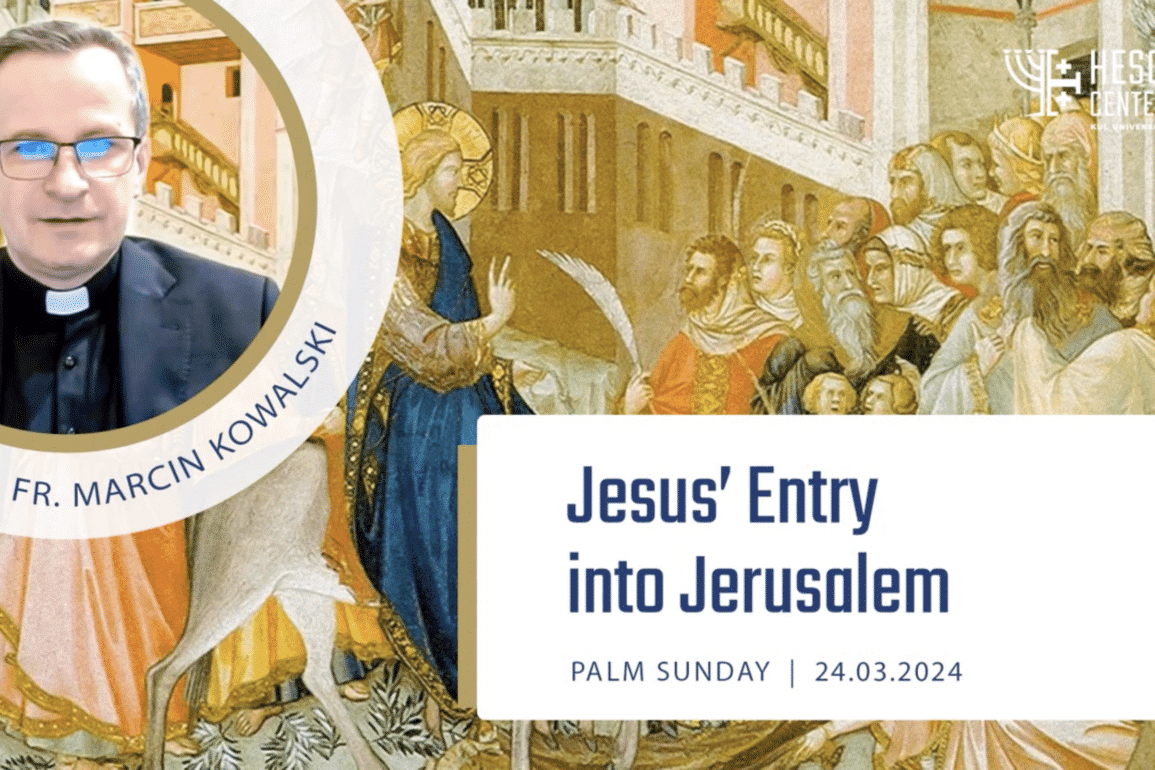Palm Sunday is a prelude to the Holy Week of the Passion, Death and Resurrection of Christ. For Christians, it is the most important time of the liturgical year. This year we read the Gospel of Mark which narrates Jesus’ entry into Jerusalem – stressed Fr. Marcin Kowalski, professor of the Catholic University of Lublin – doctor of biblical sciences, Director of the Abraham Joshua Heschel Center for Catholic-Jewish Relations at the Catholic University of Lublin.
According to scholars, this is the first and the oldest of the Gospels. Jerome argues that Mark wrote it at the request of brothers in Rome. The focal point of the Gospel is Peter’s confession at Caesarea Philippi (8:27-30). After this confession, Jesus is heading to Jerusalem, where the prophets’ predictions about him are to be fulfilled.
Entering Jerusalem, the Master makes sure that the disciples understand in his life the fulfillment of the prophecies about the humble King – the Messiah.
Jesus arrives in the Holy City from the direction of the Mount of Olives, from the direction from which the Messiah was to come, according to the prophets (Matthew 21:1; Mark 11:1; Luke 19:29; Zechariah 14:4). In Zechariah 14:4-5 we read:
4 On that day the Lord’s feet shall stand on the Mount of Olives, which lies before Jerusalem on the east (…) Then the LORD my God will come, and all the holy ones with him.
The entry itself is carefully staged by Jesus: he sends his disciples to bring him a colt that has never been ridden (Matthew 21:2-3; Mark 11:1-3; Luke 19:29-31). Matthew (21:4-5) and John (12:14-16) point out that Jesus riding in on a colt fulfills the prophecy of the Messiah arriving in Jerusalem humble, sitting on a colt, the foal of a donkey (Za 9:9).
9 Rejoice greatly, O daughter Zion! Shout aloud, O daughter Jerusalem! Lo, your king comes to you; triumphant and victorious is he, humble and riding on a donkey, on a colt, the foal of a donkey.
Jesus’ entry is also a subtle reference to Jacob’s blessing in Genesis, speaking of the coming of the one who will gain obedience among the nations (Genesis 49:10). He is to bind his foal to the vine and his donkey’s colt to the choice vine.
Finally, the entry of Jesus is the arrival of the Messiah awaited by the patriarchs and announced by the prophets, the descendant of Judah, the king who will inaugurate a new phase of the Kingdom of God without violence.
The disciples, putting their coats on the colt, affirm the royal character of the Lord’s entry. It alludes to the entry and anointing of King Solomon (1 Kings 1:38-40), or to the anointing of King Jehu (2 Kings 9:13). Cloaks are also spread on the ground by the crowds that Jesus encounters at his entry into the city; they thus affirm his royal dignity too (Matt. 21:7-8; Mark 11:8; Luke 19:36; John 12:13).
Those accompanying the Lord’s entry raise joyful shouts: Hosanna! Blessed is He who comes in the name of the Lord (Mt. 21:9; Mk. 11:9-10; Lk. 19:38; Jn. 12:13). The cry appearing in Psalm 118:25-26 means “(Lord) save.” In Jesus arriving in Jerusalem, the saving presence and closeness of God is revealed.
Finally, the crowds blessing Jesus perceive in him the announced Messiah, the Son of David (Matthew 21:9). Jesus belongs to the Davidic line thanks to his earthly father, Joseph. In Israel of post-exilic times, the House of David is no longer in power, but there is a growing expectation for a descendant of David who will renew the kingdom of Israel and bring God’s kingdom to earth.
The Messiah announced by Zechariah, the descendant of David, the humble king who brings peace, the representative of the poor and oppressed, arrives in Jerusalem. It is impossible to understand Jesus’ entry into the Holy City without the writings of the First Testament. The Messiah, fulfilling the predictions of the prophets, arrives to give his life in Jerusalem and thus usher in a new phase of the Kingdom of God.
About the Author:
Marcin Kowalski, professor of the Catholic University of Lublin – doctor of biblical sciences, Director of the Abraham Joshua Heschel Center for Catholic-Jewish Relations at the Catholic University of Lublin, member of the Pontifical Biblical Commission, defended his doctorate at the Pontifical Biblical Institute in Rome, lecturer of Holy Scripture at the Major Seminary in Kielce and Lublin, assistant professor at the Department of Biblical Theology and Proforistics at the Institute of Biblical Studies of the Catholic University of Lublin, editor-in-chief of the Bible quarterly The Biblical Annals, secretary of the Association of Polish Bible Scholars for the third term. His scientific and pastoral passion is the Bible, especially the letters of St. Paul.










